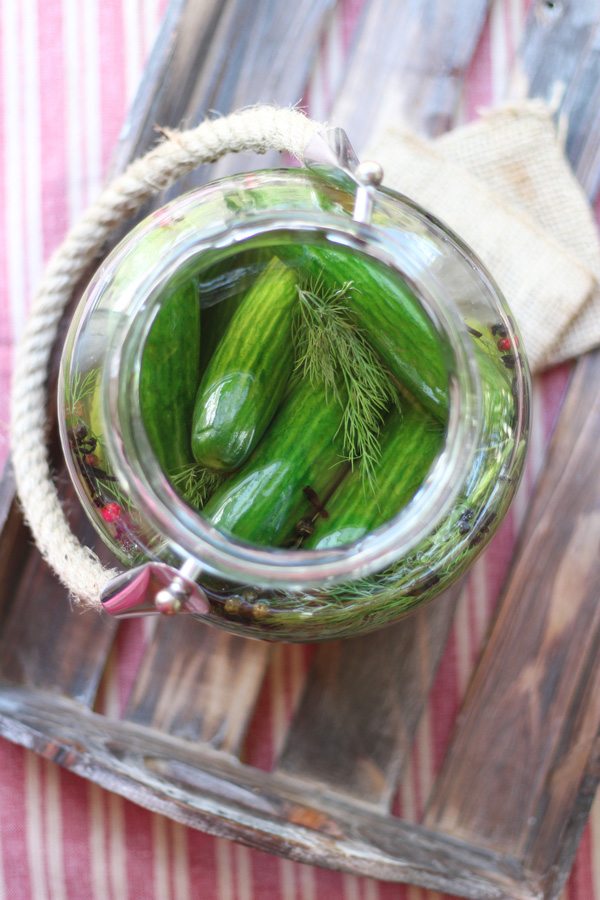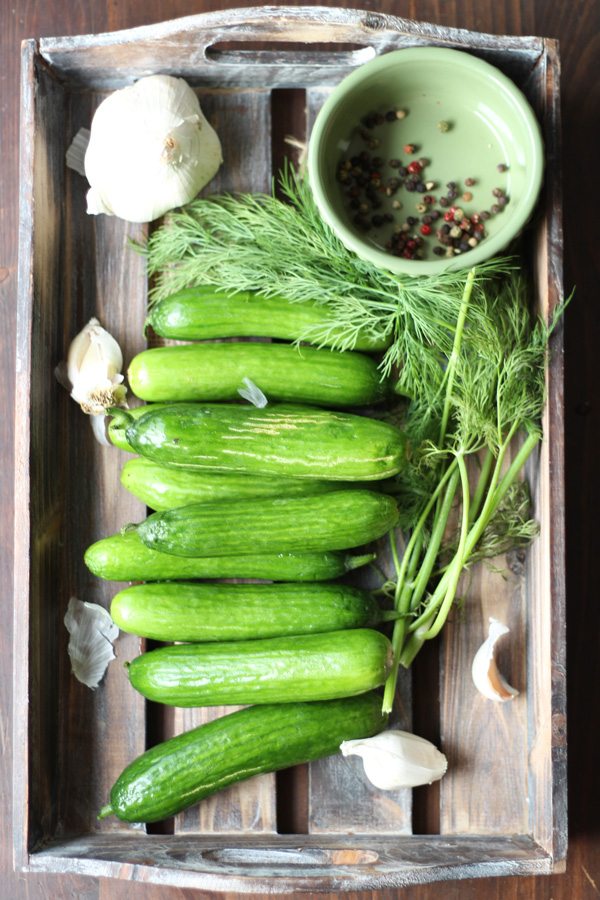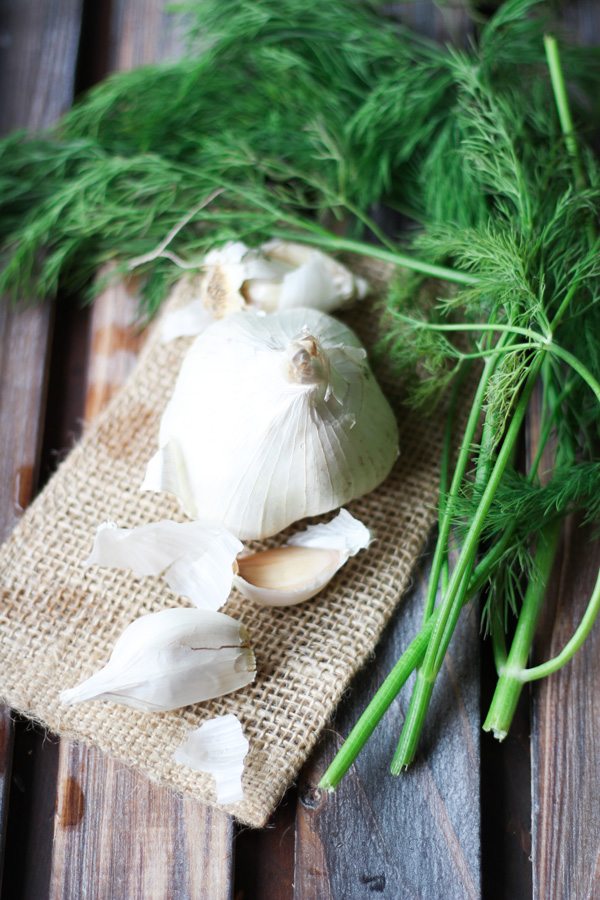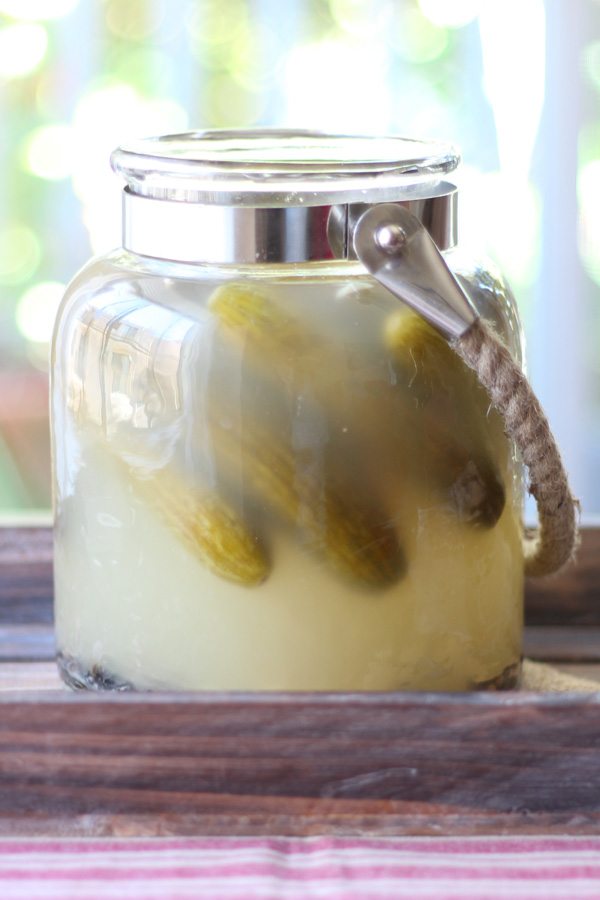Hello fellow pickle lovers! This recipe was inspired by the DIY Pickle Station at the Santa Barbara Fermentation Festival over the summer. My husband is from Santa Barbara so we go up there from time-to-time to visit his family.
Santa Barbara is a small town nestled between the beach and the mountains surrounded by grapevines and beautiful seas. Sounds terrible right? I love visiting SB and was super, duper ecstatic when I found out there was a fermentation festival going on the same weekend we were going. Like jumping up and down like the fermenter nerd I am.
The festival was awesome! There was every ferment you could think of. Kombucha, kombucha popsicles, kefir, water kefir, fermented vegetables of every kind, kvass, meats, cheeses and of course pickles. The summer was the first time I ever made pickles and they were O-K. There was too much clove in them so they tasted a little funny. But I was determined to experiment, get it right and create a recipe that was pure pickle heaven. And I did or you wouldn’t be reading this right now.
Making your own pickles is sooooo much better for you then buying ones from the store and it’s easy. Store bought usually have distilled vinegar and are loaded with salt and other additives that are not good for you. If you do buy store bought pickles, I recommend the Bubbies brand or check the list of ingredients. They should only have pickles, water, salt and pickling spices, and the brine should be cloudy. If the brine is clear and if there is anything else in the ingredient list, put it down and check another.
These pickles are rich with nutrients and probiotics, because I used the lacto-fermentation method. Lacto-fermentation is the oldest form of food preservation in the world. It creates an anaerobic environment where only the good Lactobacillus bacteria thrive and where bad bacteria cannot survive. The result is a pickle that is loaded with probiotics and therefore promotes a healthy gut. Eating probiotic foods like this strengthens your immune system, increases vitamin and mineral absorption and helps balance hormones.
AND its very easy. It’s one of the easiest ferments ever. Not kidding.
The Secret Ingredient
One ingredient I wasn’t familiar with at the time was the addition of a grape leaf. Apparently the grape leaf adds tannins to the brine which makes the pickles crunchy. I searched and couldn’t find grape leaves anywhere in San Diego or the interwebs. So, I gave up on the grape leaves and went looking for an alternative. Well I found one and it worked! I know the anticipation must be killing you…. It’s tea leaves! Yes, tea leaves. If you add tea leaves to the brine it will make the pickles crunchy. Crazy huh? The great thing is that tea is easy to find (like in my pantry always) and bonus…they don’t change the flavor of the brine.
How to make crunchy pickles using my secret ingredient. This recipe is super easy, very healthy, crunchy and delicious.
- 2 mason jars (old pickle jars or fermentation crocks work too)
- About 10 small Persian Cucumbers
- 1 tablespoon garlic roughly chopped
- 1 tablespoon whole peppercorns
- 4 bay leaves
- 2 fresh dill head fronds
- 2 teaspoons loose leaf black tea leaves
- Brine: 2 tablespoons sea salt, 4 cups water, 1 tablespoon Bragg Apple Cider Vinegar
- Divide the ingredients up between the two mason jars. Add the cucumbers to the jars and add in the garlic, peppercorns, bay leaves, fresh dill and tea leaves.
- Make the brine and pour into the mason jars, covering the pickles completely.
- Weigh the cucumbers down by using a clean rock, a small ramekin or any other thing you can find in your house. I used a plastic lid and then put a glass ramekin on top of that to hold them down. It's super important for them to stay submerged under the brine or they will mold.
- Seal with a lid or cover with a cloth to keep bugs out.
- After 4-5 days, check a cucumber to see if its ready.
- The pickles are ready when they smell like pickle heaven, the brine turns cloudy and the cucumbers turn a yellow/olive green.
Using tea leaves isn’t the only way to get a crunchy pickle. You can use a fresh grape leaf, oak leaves or horseradish leaves too.
If you’re still having trouble getting crunchy pickles, check out my 8 Tips For Crunchy Pickles here.
Resources
Pickling & Fermentation Supplies
Some links on this page are affiliate links and they are all for companies that I support and buy from myself. If you decide to purchase any of these products through these links, I will earn a small commission and you will have my sincere thanks for supporting Fermented Food Lab.




Are these supposed to stay out in the counter while they ferment or wait in the fridge? It’s my first time making pickles and Im really excited!
Hi Lori,
The pickles need to stay out on the counter in order for fermentation to take place. The brine will start to get cloudy in the next couple of days which is a good sign. Taste a piece of them after about 5 days and if they smell like pickle heaven and taste like a pickle put them in the fridge to stop fermentation. They are ready to eat then.
Since it’s winter they may take a little longer to be ready. The cold slows fermentation down. Let me know if you have anymore questions :)
Can these be canned? I’d like to make several jars at one time. What are Persian cucumbers? I’ve never seen those here in KC. Are they similar to English? Thanks in advance for the recipe and guidance.
Hi Ellen, this recipe isn’t meant for canning, but they will last in cold storage for 2-3 months. Preferably a refrigerator of if you have a cool basement or a cold garage this time of year may work. So you should have no problem making several batches at a time.
Persian cucumbers are a smaller variety. I have tried to pickle larger cucumbers but didn’t get the same crunch I get with the small ones. Any small and firm cucumber will do.
Hi Danielle, I am echoing your experience with the larger cucumbers. Since I had to slice those big honkers to make them fit, they were not crispy. However, the taste is fantastic. Next time, instead of opening a so-so brand tea bag and dumping it into the jar, I’d use organic tea leaves. My garden cucumbers are growing inches under the full moon as I write this!?
Wow, tea leaves, that is so interesting! Thanks I always wondered why my pickles weren’t particularly crunchy.
Funny how adding weird ingredients does the trick sometimes :)
I was wondering, will green tea work as well? I’m unsure of the levels on tannins in green tea vs. Black tea.
Green tea leaves will work too.
Danielle, I made this recipe last Sunday. I checked my pickles today and they leaked all over and both jars are rotten. Any ideas on what I did wrong?
Thanks!
Hi Diane,
It may be the temperature. If it’s too hot, they will ferment faster than usual and if left too long can go bad. I usually put them in a cool place and check them every 2-3 days to see if they are ready. Other things that could cause to go bad is amount of salt. If there wasn’t enough salt to inhibit the growth of mold they could go bad.
Hi Danielle!
I made these pickles this week…SO GOOD! But I have a question…It’s hot where we live (85 F plus) and we haven’t been using AC. The pickles were ready based on your description after 48 hours (and they are GREAT). Does such a short fermentation time mean we aren’t benefiting from the fermentation? I’m just curious. As I said the pickles are super tasty so I’m really happy anyway.
Hi Sara! During the summer when the weather gets warmer, the fermentation time shortens. It’s fine that they are ready in 48 hours and they should have the same benefits as pickles that take longer to ferment :)
I’ve just been given large type cucumbers and am wondering can I slice them and use this recipe or will it only work for smaller whole cucumbers?
Hi Jeri, You can use any size cucumbers. The larger they are, the longer they will take to ferment. In my experience smaller ones tend to come out more crunchy than larger ones. You can slice them up too.
Thanks, can’t wait for my jars to arrive tomorrow!
Hi, I ferment quite a few things (sauerkraut, kimchi, cucumber pickles, fiddleheads, green beans, etc.). I am interested in typical sodium content comparisons between store bought vinegar based dill pickles and those fermented with a 3T/Qt salt/water mix. The sodium content is the only drawback i can see to fermenting with brine. I rinse/soak beans, fiddleheads, etc. before using but don’t soak the cucumber pickles before people eat them – not cool I think. Thoughts on sodium?
Hi Karl, I avoid vinegar based pickles from the store, because they lack the probiotic bacteria that naturally fermented pickles contain and they use cheap salt that is high in sodium chloride. I use mineral rich salts that are lower in sodium chloride and higher in minerals. These salts taste less salty and add beneficial minerals to my diet. I go into more details about salt in this post. https://www.fermentedfoodlab.com/dos-donts-using-salt-fermentation/
Why do you put acv in the brine? I love fermenting my own pickles (and everything else), but have never used acv. I used oak leaves from my front yard tree, or grapevine leaves from a neighbor. Good to know that I can use tea leaves.
Just wondering what type of oak leaves did you use? I’ve just read that white oak tannin is too much and I think that’s all I have access to. Thank you.
Where did you get that cute jar?
I found it at a garage sale :)
I’m new to fermenting. Are the ingredients washed, or will that limit bacteria, and is there offgassing during the fermentation process? I would like to make batches in mason jars with seated but unsealed lids during fermentation, then crank the rings down and refrigerate once fermented reducing the oxygen in the jars.
Hi there – first timer here. I’m inspired to try this later today based on your awesome recipe! After you’ve dumped your brine into the jar, does the jar need to be sealed with it’s lid or just covered so it can breathe (such as when doing kombucha)? Thanks in advance!
I just made my first batch of pickles. I didn’t have access to any fresh leaves so I bought a bottle of grape leaves from Earth Fare (organic / no preservatives). I used 6 leaves. Is this okay or do I need to toss my cucumbers. Thanks.
Hello, I noticed your pickles have a lot more room in the jar then mine do. They are kinda wedged into the jar some. do they need more room and should I take one out? This is my first ever try in fermented food. I have been doing water kafir for a while. Thanks!
I give them a little room so they don’t get squishy. I wouldn’t jam them all in there.
How long will these keep?
Several months if you keep the pickles submerged under the brine and in the refrigerator.
Just made my first batch and used white tea leaves. They have a great crunch. I found them more salty than dilly. While the salt to water ratio can’t be changed I will definitely make them again but will add a bit more dill and garlic to give them more flavour. While this is my first time making fermented foods I have been making milk and water kefir for some time now.
Hi Danielle,
I’m new to fermenting. I’ve done sauerkraut, kimchi, red onions, and miso red onions so far. All came out very tasty. I want to try cucumber pickles now. My question is can I use baby english cucumbers and do I need to skewer them during prep? I read that on a refrigerator (vinegar brine) recipe to help them keep from being mushy.
Yes, you can use baby cucumbers and no you don’t need to skewer them. There are some more tips on how to keep them crunchy here.
https://www.fermentedfoodlab.com/tips-for-crunchy-pickles/
Hi, please kindly clarify two things for me. Do l boil the brine or not, also after pouring the brine into the jar, does it go immediately into the fridge or keep it out for the first 5 days. love your recipe and honestly want to try it.Please help. Thanks
No, don’t boil the brine. It will go in the refrigerator after it ferments on the counter for 5 or more days.
Thank you!
I am Mormon and therefore cannot use tea leaves. However, grape leaves are easy for me to get… grapes actually grow wild here. Could you please either send me a link to the original recipe (or the recipe itself) or post it?
Andie
How important is the ACV (can I swap in distilled white?), and does it need to be Bragg’s (or one that’s similar and has the “mother”)?
Hi,
I don’t have tea or grape leaves. Can I use a tea bag instead?
Thanks :)
is it OK to add turmeric and curry powder for flavor. I alsp pickle cauliflower and cabbage and add turmeric and curry powder
Yes.